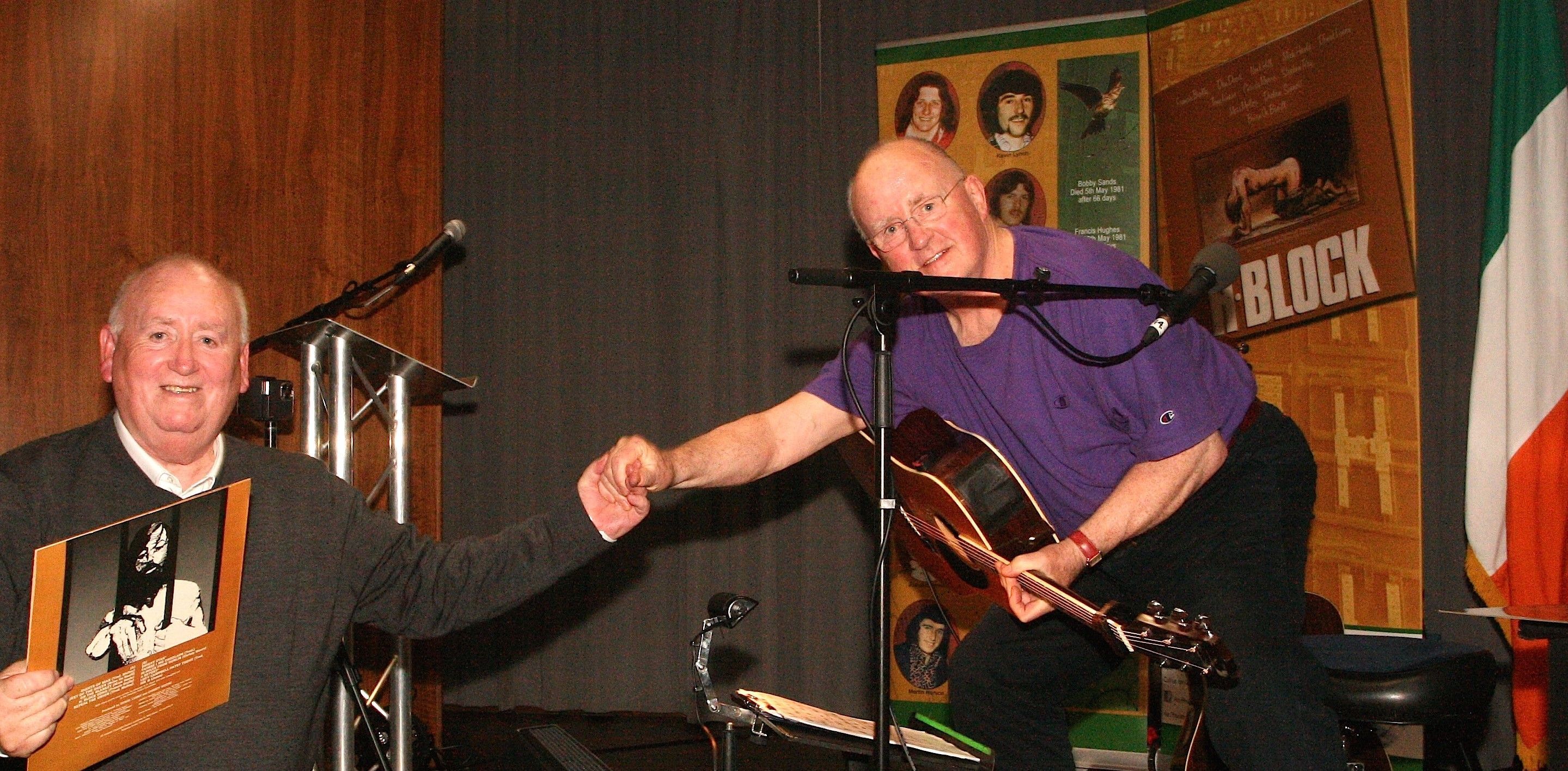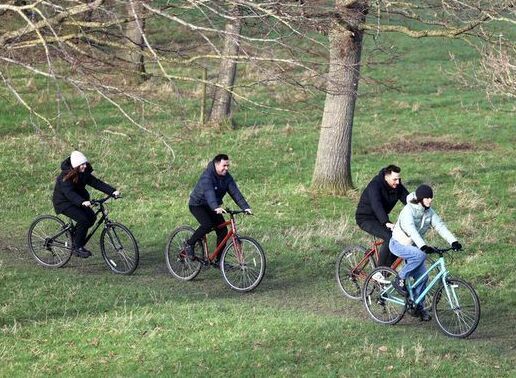The first time Christy Moore sang "Ninety Miles from Dublin" in West Belfast - his song about the obscenity of the H-Blocks - was in the old Ballymurphy Tenants Association building on the Whiterock Road in the summer of 1980.
Tom Cahill had asked Christy to come to the city and play a set. Still not sure of the words, Christy had a piece of paper on which the words were written taped to the microphone.
The H-Block LP, which had been recorded over the previous two years, was also released that summer a few months before the first hunger strike commenced and at the height of the public campaign in support of political status.
It has ten tracks and the wealth of talent on display is formidable. Christy Moore, Francie Brolly, Dan Dowd, Mick Hanly, Noel Hill, Tone Linnane, Donal Lunny, Matt Molloy, and Declan Sinnott. Actor Stephen Rea reads three poems, two of them written by prisoners in the H Blocks and smuggled out from the prison.
Through words and music, the plight of the prisoners in the H-Blocks and in Armagh prison, and the strength of their endurance and resistance is evoked. The LP includes "On the Blanket" by Mick Hanly; Francie Brolly’s iconic "H-Block Song," and "90 Miles from Dublin" by Christy Moore.
I tell you all of this because the H-Block album has been remastered as a not-for-profit production by the Green Cross, and as part of the 40th commemoration of the hunger strikes of 1980 and '81. It is a tribute to the courage and resilience of twelve men who died on hunger strike.
The re-launched album received its first public presentation at an event last Friday evening in the Felons Club on the Falls Road. Speaking about the role, impact and importance of music and art, of film and the written word, former blanketman and hunger striker, Laurence McKeown, told those present that the arts have the ability to move people to tears, to lift confidence and provide hope, and to make the hairs on the back of your neck stand up. Friday night was such a night.
Christy Moore, in fine form, sat alone on the stage reminiscing and singing. The audience was enthralled. It was an intimate event, more like a family gathering than a gig. Christy was obviously enjoying the appreciative audience response to his songs and stories. Many had tears in their eyes as Christy interspersed "No Time for Love," "Only our rivers run free," "Back Home in Derry," "McIlhatton," and other songs with stories from those years.
He spoke fondly of Bobby Sands and described "McIlhatton" as one of the finest pieces of poetry he has ever read. He wondered what other marvellous pieces of prose and song Bobby might have written had he not died on hunger strike. Christy also recalled his good friends, Tom Cahill and Bob Murray, and their drive to use music to highlight the injustice of the H-Blocks and Armagh.
"Ninety Miles from Dublin," which he plans to rewrite as a tribute to Kieran Nugent, had its roots in conversations with former blanketmen Kieran, Fra McCann and Ned Brown about their experiences in the H-Blocks. Christy recalled that when the LP was launched in Dublin the venue was raided by the Garda Special Branch who confiscated all of the LPs that were there. Ten years later at a concert a man – who identified himself as one of the Branch men on the raid – presented Christy with two of the original LPs. Christy then surprised Fra McCann, who was in the audience, by calling him up and presenting him with one of his two copies.
Christy also recollected a visit to the H-Blocks in 1986 in a clapped out minibus - one of a small fleet used to bring the relatives of prisoners to the jails each day. Afterward he made another album, "The Spirit of Freedom," with the image of the Lark – Bobby Sands symbol – on the front cover. He presented Bob and Maureen Murray with a copy of this.
It was a poignant, hugely enjoyable, uplifting evening of song and craic. Thank you Christy for a memorable evening. A small limited edition in vinyl of H-Block LP has been produced, as well as the CD. The LP and CD are available through An Fhuiseog, 55 Falls Road. www.thelarkstore.ie The CD is available through Republican Merchandising Ltd as: The Sinn Féin Bookshop 0035318726100: www.sinnfein bookshop.com
WORKING TOGETHER
In the 2011 census figures, and then in the statistics drawn from the 2017 Multiple Deprivation Measure (MDM), areas of Belfast are identified as either Protestant or Catholic depending on the relative size of the respective population in each. As much as this column dislikes identifying people by religious labels that's the way it is done in these projects. There are 174 so-called Super Output Areas (SOAs) in the city, each with a population on average of just under 2,000 people.
Did you know that according to these figures that overall Belfast was 47% Protestant in 2011? Or that in 2017 the highest income poverty rate in Belfast was in Woodvale 1 (24.7%) which in 2011 was 91% Protestant? Or that the area with the second highest area of income poverty in Belfast was Ardoyne 2 (24.6%) which in 2011 was 95% Catholic?
Or that in the poorest 30% of Belfast 17 out of 52 SOAs are "Protestant areas." And that Protestants form 44% of this population. Overall within the city Catholics continue to experience greater levels of poverty, however it is also true that many loyalist working class areas endure similar levels of deprivation in relation to health and disability, crime, and their living environment.
None of the larger unionist parties have shown the remotest interest in seriously challenging these problems. Everything is subordinated to maintaining a status quo that will condemn the next generation of young people to the same levels of poverty their parents have known.
Several weeks ago, before the EU produced its recent proposals on the Protocol, the DUP, UUP and TUV participated in a discussion at the Tory Party conference. It was intended to expose the damage being caused to the North’s economy by the Protocol. Instead it succeeded in confirming that the Protocol is proving advantageous to business in the North and across the island of Ireland.
Last week, new figures from the Irish government’s Central Statistics Office revealed that cross-border trade on the island of Ireland continues to sharply increase. In the first eight months of this year exports from the South to the North grew by 47% compared to the same period in 2020 – from €1.516 billion to €2.223 billion.
Trade going North to South grew even greater by 61% - from €1.553 billion to €2.5 billion.
For the British Brexit Minister this was his biggest concern. He told the Tory meeting: “we are definitely seeing supply chains being reordered quite quickly. Trade between Northern Ireland and Ireland has gone up a lot in both directions.” His worry is that this “will weaken the links with GB. I think that’s inevitable.”
Once again the conservative unionist parties in the North choose to put their political self-interest above that of the working class loyalist families who will carry much of the burden of a Brexit decision that will impose increasing hardship.
Republicans believe that the best future for the people of the island of Ireland is through reunification. Working together as neighbours republicans believe that we have the wit and the wisdom to shape a new Ireland that meets the concerns of all, including our unionist brothers and sisters.
Unionist or Loyalist representatives working constructively with Republican representatives inside or outside of the Assembly and local councils will not make them any less committed to their connection to the union with Britain, no more than it would diminish the commitment of Sinn Fein representatives to a united Ireland. But it would mean better outcomes for those communities that constantly top the lists of those with severe poverty and deprivation.
SAMHAIN
October is the month of Samhain. This ancient Celtic festival is one of the four quarter days, Imbolic, Bealtaine, Lughnasa and Samhain, in the old Gaelic calendar. It is celebrated on 31 October-1 November. Samhain is noted in the earliest Irish literature. It marks the end of the harvest season and the beginning if the "darker part" of the year, winter. It is also believed to be the time when the boundary between this world and the other world relaxes so that the spirits can come into this world. The souls of the dead are said to return to their homeplaces. This led to many tricks and game which continue to this day. People dressing up, mumming, alongside more serious rituals.
Samhain is the precursor of Halloween. The exiled Irish brought it to North America where hallowed out Pumpkin lanterns replaced the Turnip lanterns of Ireland.
So as you celebrate Halloween, or Oiche Shamna, remember that before the English conquest of Ireland we had an advanced civilisation with its own customs, beliefs, music, culture and language, some of which endures to this day against all the odds. It is also a timely reminder that nothing stays the same. Change happens and this Samhain brings us all another year closer to ending the conquest. Oiche Shamna faoi mhaise daoibhse Buiochas.
OUR THANKS
Our thanks to Brendan Kennelly and Máire Mac an tSaoi, two of our finest poets and who died last weekend, for their work and for the wonderful legacy they left us all, in the Irish and English language. Their words will endure forever. Here is Brendan:
"Though we live in a world that dreams of ending,
that always seems about to give in,
something that will not acknowledge conclusion
insists that we forever begin."








